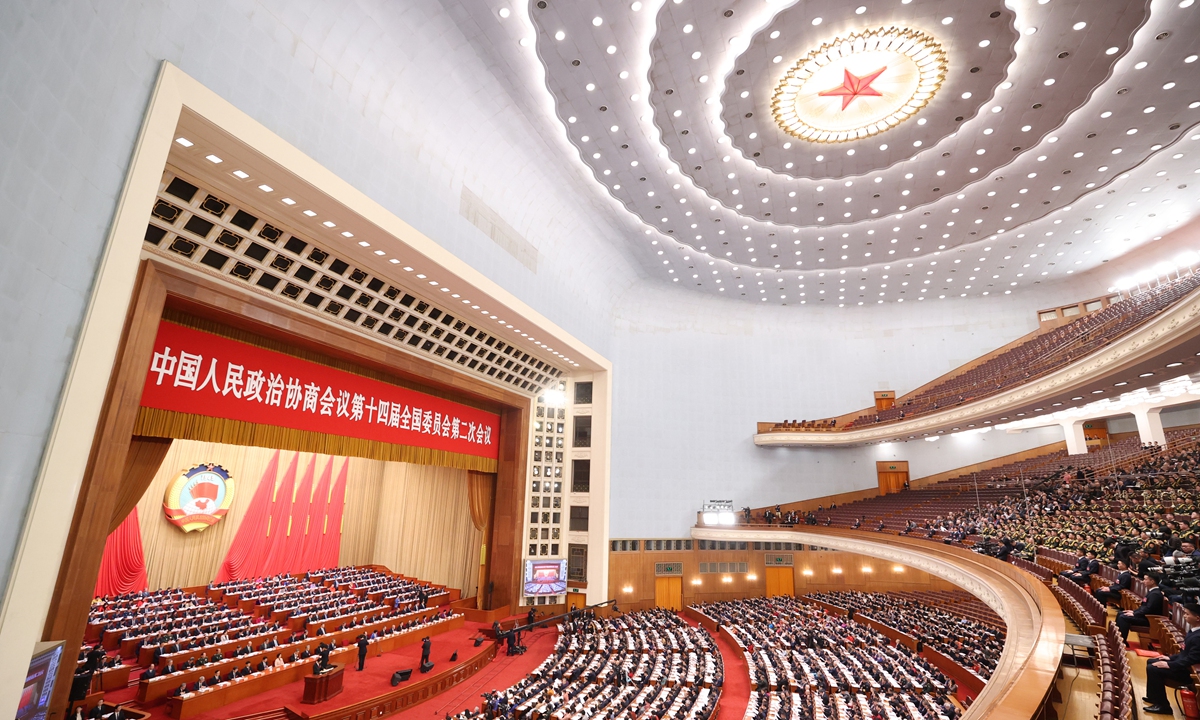China’s two sessions gather strength for high-quality growth as nation vows development of new productive forces

The opening meeting of the second session of the 14th National Committee of the Chinese People's Political Consultative Conference (CPPCC) is held at the Great Hall of the People in Beijing on March 4, 2024. Photo: cnsphoto
China's top political advisory body started its annual session on Monday in Beijing, ushering in an important political season that will highlight new missions to steadily boost high-quality development in a bid to build the country into a great modern socialist country while injecting new impetus into global growth.
This year marks the 75th anniversary of the founding of the People's Republic of China and is a key year for achieving the goals outlined in the nation's 14th Five-Year Plan (2021-25). In this pivotal year of comprehensively deepening reform, analysts and deputies and members to the two sessions expect major measures to be announced at the key political event to further promote high-quality development and advance Chinese modernization.
Observers projected that China's high-quality development in 2024 and medium to long term will be driven by new productive forces such as artificial intelligence (AI), digital economy and other innovation industries. With continuous improvement in economic structure, strong economic development momentum and sound development trend, the Chinese economy will remain a promising destination for foreign investment and a major engine driving global growth.
New productive forces
At the 11th group study session of the Political Bureau of the Communist Party of China (CPC) Central Committee held on January 31, 2024, Xi Jinping, general secretary of the CPC Central Committee, said that developing new productive forces is an endogenous requirement and a pivot for high-quality development.
Sci-tech innovation has become an important driving force for China's development. Recently, the term "new productive force" has become a key word for central and local governments in their arrangement of economic work, and is also an area that national legislators and political advisors are expected to provide suggestions for during the ongoing two sessions.
"New productive forces represent advanced productivity and is an important direction of China's development. The vigorous development of new productive forces will eventually help achieve high-quality development in China," Yu Miaojie, president of Liaoning University and a deputy to the 14th National People's Congress (NPC), told the Global Times on Monday.
In order to boost the development of new productive forces, China should further increase investment in original innovations and basic research, Yu said. In 2022, the country's investment in basic research accounted for 6.57 percent of the total research and development (R&D) spending, and the share should further climb to 7 percent or even 10 percent by the end of 14th Five-Year Plan period (in 2025), he said.
The development of new productive forces is currently picking up speed in China. Along with advances in the new technological revolution and industrial transformation, data, computing power and AI have become new drivers of new productive forces.
Yang Jie, chairman of China Mobile and a member of the 14th National Committee of the Chinese People's Political Consultative Conference (CPPCC), suggested that the country boost the "AI+" campaign at the national level by strengthening top-level design and clarifying development goals and key tasks, in order to give full play to the huge potential of AI in achieving leapfrog development of technologies, industrial upgrade and productivity.
Comprised of AI and the manufacturing sector, smart manufacturing is an important part of new productive forces. However, China's smart manufacturing faces three major problems: Supply capability needs to be strengthened, application needs to be promoted and a standard system needs to be established, said Zhong Zheng, an NPC deputy and vice president of the Midea Group.
She suggested that the country support leading companies in various industries to take the lead in developing industry solutions so as to help more companies set up world-leading smart factories that contribute to sustained development.
While new productive forces are important to the world's second-largest economy, private enterprises also need to earnestly enhance their own productivity and boost transformation surrounding sci-tech innovations, Wang Junjin, a member of the 14th National Committee of the CPPCC and chairman of Shanghai Junyao (Group) Co, told the Global Times on Monday.
Wang said that efforts should also be made to inject momentum into the country's burgeoning consumption sector, for example by building new business models and new spending scenarios in order to drive the high-quality development of China's economy.
Vibrant economy
China's economy grew by 5.2 percent year-on-year in 2023, contributing to more than 30 percent of the world's economic growth. More importantly, steady progress was made in pursuing high-quality development last year, with consumption playing a larger part in driving growth, tech innovations making breakthroughs and new momentum accumulating.
The Chinese economy kicked off 2024 with a robust display of economic resilience and vitality. For example, China saw 474 million domestic tourist trips during the eight-day Spring Festival holidays that ended on February 17, up 34.3 percent year-on-year. China's box office revenue during the same holiday season reached 8 billion yuan ($1.1 billion), setting a new record for the period.
"Overall, China's development is seeing more favorable conditions than unfavorable ones, and the overall trend of China's economic recovery and long-term improvement remains unchanged. We have plenty of confidence in that," Lou Qinjian, spokesperson for the second session of the 14th NPC, said at a press conference on Monday, one day ahead of the opening of its annual session.
It is widely expected that policymakers will set a GDP target of around 5 percent for 2024 in the Government Work Report to be delivered by Chinese Premier Li Qiang on Tuesday, which will greatly boost market confidence and gather strength for the high-quality development of the economy.
The two sessions are a timely and clear response to certain pessimistic voices on the Chinese economy, mainly from Western countries, Han Baojiang, a member of the 14th National Committee of the CPPCC, told the Global Times.
"Chinese policymakers are sober and their approach to economic development - as shown by the Central Economic Work Conference and the Government Work Report set to be delivered on Tuesday - is very clear," Han said. "To put it simply, improving our economy, enhancing people's livelihoods, and ensuring stable employment may be the most effective way to deal with all those challenges."
Foreign chambers of commerce and companies operating in China have also shown confidence in the prospects of the Chinese economy, eyeing greater opportunities from Chinese modernization.
"China remains an important market for our member companies," Juha Tuominen, chairman of FinnCham Beijing, told the Global Times, saying that the chamber's latest surveys showed that Finnish companies are positive about Chinese market potential.
Although the Chinese economy faces challenges such as weak consumption, a property market downturn and weak export momentum, the Chinese government has drawn up the appropriate policies. It's hoped that there will be an improvement after this year's two sessions, and Panasonic will strengthen local operations to deal with market changes, Tetsuro Homma, executive vice president of Panasonic Corporation, told the Global Times.
"China is the most important technology and supply chain base for Panasonic… We will closely follow topics such as healthcare, smart manufacturing and green development during the two sessions and are seeking opportunities in other key areas as well," Homma said.
Photos
Related Stories
- New productive forces spurring revival of northeast China
- Understanding 'new productive forces'
- Consumption upgrade boosts new productive forces
- China to defuse risks in real estate, local gov't debt, small and medium-sized financial institutions
- Commentary: China's economic growth target feasible, uplifting
- China pledges proactive fiscal policy, prudent monetary policy in 2024
Copyright © 2024 People's Daily Online. All Rights Reserved.









